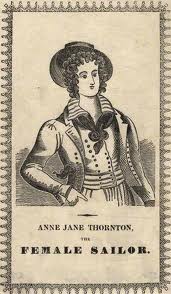 |
November’s item of the month is a broadsheet entitled 'The female sailor: a faithful history of the romantic and perilous adventures of that interesting young female Anne Jane Thornton’, c.1845 (ref. PBH2390).
In these days of Ellen MacArthur, it is no surprise to hear about a female sailor. In earlier centuries, however, women were regarded as bad luck aboard a ship. Nevertheless, a few women disguised themselves as sailors and went to sea as a member of the crew. Sometimes they did this to follow their beloved, or they were coerced, or they wanted to experience life aboard ship. On their return, their stories were popularised in autobiographical accounts and inspired ballads.
There are several accounts of women who dressed as sailors in the 18th century including Hannah Snell (1723–1792), who was also a female soldier, Mary Anne Talbot (1778–1808) and Anna Maria Real (fl. 1780).
The Archive and Library has recently acquired a broadsheet about another female sailor, Anne Jane Thornton (1817–1877). This tells the story of how she ran away to sea as a sailor to find her lost love who had returned to his home in the USA, only to find that he had died (the Oxford Dictionary of National Biography entry states that in fact he had married another), and her journey back to Britain as a cook and steward aboard the Sarah.
This broadsheet follows the standard format – a dramatic headline and summary, a woodcut to illustrate the story (possibly showing Thornton’s sweetheart Captain Burke departing to the USA leaving Anne behind, or showing how she metamorphosed from a demure female into a sailor), followed by an in-depth account, and finishing with a ballad at the foot of the sheet. Broadsheets containing ballads were sold by peddlers and street vendors (this was before cheaply printed newspapers were available for the masses).
Our broadsheet complements a coloured woodcut print of Anne, this time in her sailors costume, held in the NMM’s Prints & Drawings collection (PAD 3045) and available on Collections Online. There is also another version of the broadsheet, showing Anne in sailor's costume, in Brown University Library, USA illustrated in M. Creighton and L. Norling’s book 'Iron men, wooden women: gender and seafaring in the Atlantic world, 1700-1920’, available in the Caird Library (PBP4237).








2 comments:
What I would have done to be a woman sailor on board one of those ships! Well, maybe only for a day. Im sure it was not the best of conditions. It makes me wonder if the men knew that they were women after time passed, or if they really were fooled. I would guess that if someone found out, overboard she would go! Unless, of course, she was useful and they needed all the "men" they could get.
Thanks for also posting all the references. Very interesting.
Thanks for the post and glad it stirred your imagination! You know Melville in Moby Dick explored the state of imbalance due to the absence of the "feminine" :)
Post a Comment